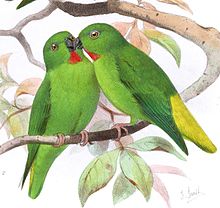Bismarck hanging parrot
| Bismarck hanging parrot | |
|---|---|

| |
| Two females | |
| Scientific classification | |
| Domain: | Eukaryota |
| Kingdom: | Animalia |
| Phylum: | Chordata |
| Class: | Aves |
| Order: | Psittaciformes |
| Family: | Psittaculidae |
| Genus: | Loriculus |
| Species: | L. tener
|
| Binomial name | |
| Loriculus tener Sclater, 1877
| |
The Bismarck hanging parrot or green-fronted hanging parrot (Loriculus tener) is a small species of parrot in the family Psittaculidae. It is endemic to forest in the Bismarck Archipelago in Papua New Guinea. It is threatened by habitat loss. It is sometimes considered a subspecies of the orange-fronted hanging parrot.
Description
Both genders feature a mainly green body with a bright red patch on its throat, a black beak, and yellow eyes. Males have a yellow/green rump with a yellow tail. Females feature green cheeks (along with males) but, have a slight green/blue wash. Juvenile birds have no throat patches, and have a brown beak and eyes.[2]
Distribution and Range
The Bismarck hanging parrot can be found on select islands in the Bismarck Archipelago. It is present on most coastal and lowland areas of New Britain and New Ireland, as it tends to avoid the central highland areas. It can also be found throughout the Duke of York Islands, New Hanover Island, Manne Island, Selapiu Island, Tsoilaunung Island, Patio Island, and other surrounding smaller islands.[3]
Ecology
The Bismarck hanging parrot is found in lowland rainforest at altitudes of up to 500 meters, but prefers to live in areas less than 200 meters in elevation.[3] The bird tends to be quite shy and is usually hidden from plain sight. It tends to interact with other species of the Loriculus genus. It is usually found in small groups of 2 to 4 individual birds. Females usually lay a clutch of 3 to 4 eggs. Its diet consists of various wild fruits, flowers, buds, and it will sometimes consume small insect larva (for extra protein sustenance).[2] It has an estimated wild population of approximately 15,000 to 30,000 birds.[1]
Threats
Like many other birds in the Bismarck Archipelago, the Bismarck hanging parrot is threatened by deforestation, encroaching human settlement, mining operations, and illegal logging.[2]
References
- ^ a b BirdLife International (2012). "Loriculus tener". IUCN Red List of Threatened Species. 2012. Retrieved 26 November 2013.
{{cite journal}}: Invalid|ref=harv(help) - ^ a b c "Green-rumped Hanging Parrot (Loriculus tener)". Parrot Encyclopedia. World Parrot Trust. Retrieved 2017-01-26.
- ^ a b "Bismarck Hanging-parrot (Loriculus tener) - BirdLife species factsheet". BirdLfe International. Retrieved 2017-01-26.

